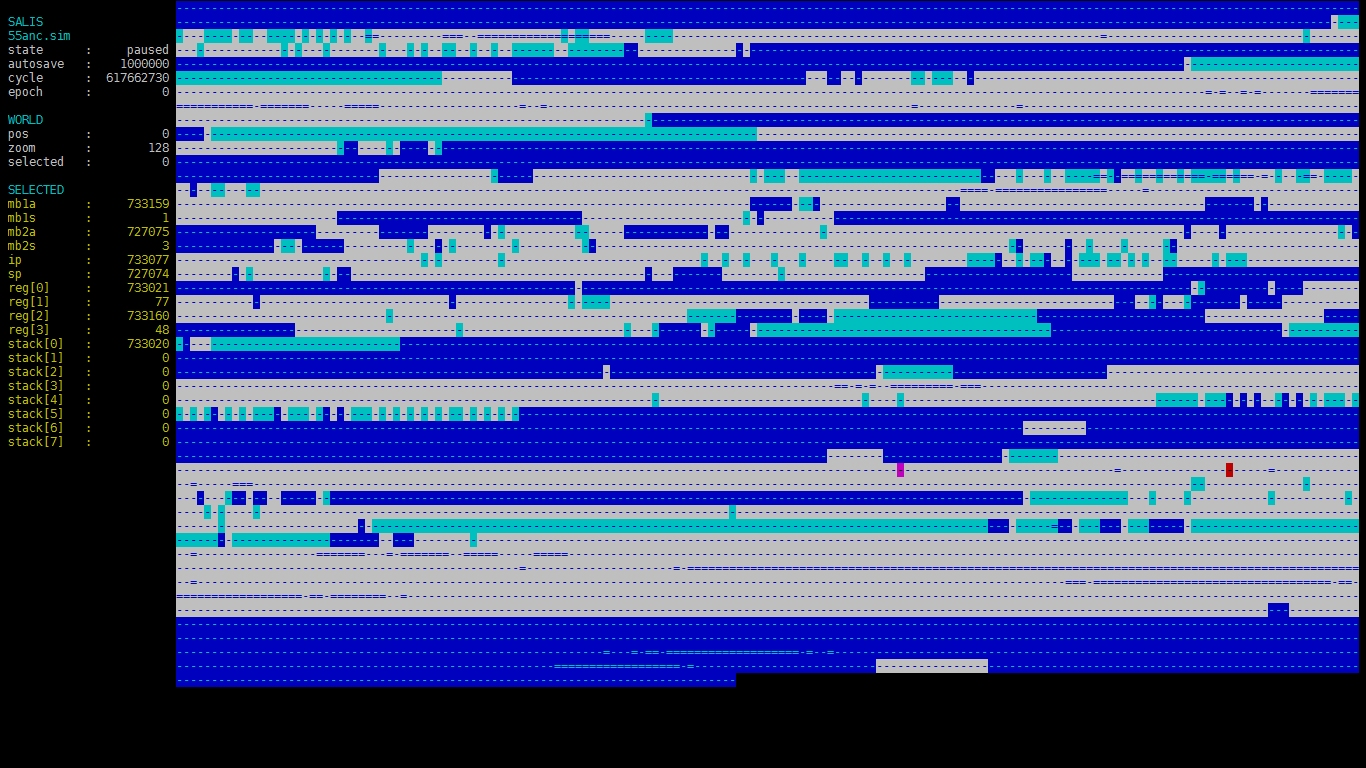SALIS is an artificial life project. Mainly a re-take on Tom Ray's TIERRA system, but with my very own set of tweaks. Having a grasp on TIERRA will make understanding this simulation a lot easier.
For those that already know TIERRA, the main differences between it and SALIS are:
- the replacement of templates with key-lock instruction pairs
- the addition of a SEEKER POINTER to all organisms
The seeker pointer (SP) is an attempt to bring extra spatial and temporal coherence to the simulation. Allocations, reads and writes will take more time when done between addresses that are far away, as a consequence of the SP having to travel those distances at a speed of 1 byte per update. In other words, in SALIS, information can't travel faster than 1 byte per update (SALIS' speed of light, if you will).
To watch an introductory video playlist about SALIS go here.
Also, follow SALIS on Reddit.
- SALIS is an API, so an UI must be written to communicate with it
- SALIS is written in C
- SALIS must be compiled as a library (e.g. libsalis.so)
- One or two associated memory blocks
- One instruction pointer
- One seeker pointer
- Four registers
- A stack of configurable size (default is 8)
- Newborn organisms are placed on top of the queue
- Organisms are killed at the bottom of the queue
- Organisms are killed whenever memory fills above 50%
In SALIS mutation occurs via cosmic rays: at every cycle a random 32 bit address is selected and a random instruction is written into it.
SALIS' organisms read a simple language similar to ASM. This language consists of 64 instructions, each with an associated name and symbol. Whenever an organism performs an invalid instruction it's considered a fault. When a fault is committed by any organism, the faulty instruction is simply ignored.
- Perform a search or attempt a jump without a following key
- Writing to an allocated (but not owned) or invalid address
- Reading (loading) from an invalid address
- SP on address non-adjacent to child memory block while allocating
- Swapping, freeing or splitting when not owning 2 memory blocks
- Dividing by zero
| Name | Sym. | Val. | Description |
|---|---|---|---|
NOOP |
00 | No operation. Does nothing. | |
NOP0-3 |
0-3 |
01-04 | No operation. Modifies registers to be used (r0x to r3x). |
JMPB-F* |
() |
05-06 | Jump to lock matching following key. |
ADRB-F* |
[] |
07-08 | Search for lock matching following key and store on r[0]. |
IFNZ |
? |
09 | If r[0] is not zero, execute following instruction. Skip otherwise. |
ALLB-F* |
{} |
10-11 | Allocate block of size stored on r[0]. Store its address on r[0]. |
BSWP* |
% |
12 | Swap parent and child memory blocks. |
BCLR* |
| |
13 | Free child memory block. |
SPLT* |
$ |
14 | Split. Child memory block becomes new organism. |
ADDN |
+ |
15 | Add (r[0] = r[1] + r[2]). |
SUBN |
- |
16 | Subtract (r[0] = r[1] - r[2]). |
MULN |
* |
17 | Multiply (r[0] = r[1] * r[2]). |
DIVN* |
/ |
18 | Divide (r[0] = r[1] / r[2]). Faults if divisor is zero. |
INCN |
^ |
19 | Increment (r[0]++). |
DECN |
v |
20 | Decrement (r[0]--). |
NOTN |
! |
21 | Not (r[0] = !r[0]). |
SHFL |
< |
22 | Shift left by 1 (r[0] << 1). |
SHFR |
> |
23 | Shift right by 1 (r[0] >> 1). |
ZERO |
z |
24 | Put zero (r[0] = 0). |
UNIT |
u |
25 | Put one (r[0] = 1). |
PSHN |
# |
26 | Push r[0] to stack. |
POPN |
~ |
27 | Pop from stack into r[0]. |
LOAD* |
. |
28 | Load instruction at address pointed by r[0] into r[1]. |
WRTE* |
: |
29 | Write instruction on r[1] to address pointed by r[0]. |
DUPL |
" |
30 | Duplicate value on r[0] into r[1]. |
SWAP |
x |
31 | Swap values on r[0] and r[1]. |
KEYA-P |
a-p |
32-47 | Keys. |
LOKA-P |
A-P |
48-63 | Locks. |
Instructions that may fault are marked with an asterisk (*) on the table above.
Instructions that modify values on registers may be followed by
up to 3 register modifiers (r[0], r[1] and r[2]). By default, all
registers are set to r0x.
| Sample | r[0] |
r[1] |
r[2] |
Meaning |
|---|---|---|---|---|
+123 |
r1x |
r2x |
r3x |
r1x = r2x + r3x |
-11 |
r1x |
r1x |
r0x |
r1x = r1x - r0x |
* |
r0x |
r0x |
r0x |
r0x = r0x * r0x |
!2 |
r2x |
--- |
--- |
r2x = !r2x |
x01 |
r0x |
r1x |
--- |
swap r0x and r1x |
]a1 |
r1x |
--- |
--- |
r1x = address of closest following LOKA |
[b |
r0x |
--- |
--- |
r0x = address of closest previous LOKB |
(to be updated...)
